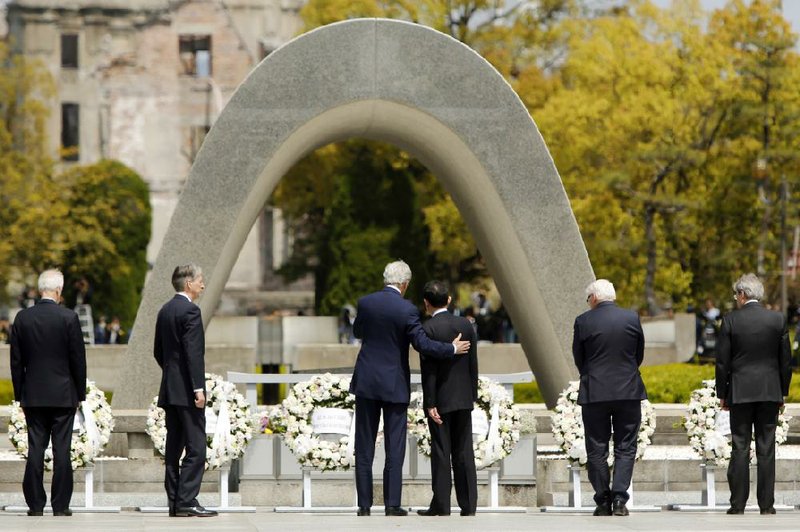HIROSHIMA, Japan -- U.S. Secretary of State John Kerry visited the revered memorial to Hiroshima's atomic bombing today, delivering a message of peace and hope for a nuclear-free world seven decades after the United States used the weapon for the first time in history.
Kerry became the most senior U.S. official ever to visit the site, touring the city's Peace Memorial Park and Museum with other foreign ministers of the Group of Seven industrialized nations. About 140,000 Japanese died in the attack in the final days of World War II.
Shortly before the scheduled event, Kerry called it "a moment that I hope will underscore to the world the importance of peace and the importance of strong allies working together to make the world safer and, ultimately, we hope to be able to rid the world of weapons of mass destruction."
"And while we will revisit the past and honor those who perished, this trip is not about the past," Kerry told Japanese Foreign Minister Fumio Kishida, a Hiroshima native. "It's about the present and the future particularly, and the strength of the relationship that we have built, the friendship that we share, the strength of our alliance and the strong reminder of the imperative we all have to work for peace for peoples everywhere."
No serving U.S. president has visited the site, and it took 65 years for a U.S. ambassador to attend the city's annual memorial service. Many Americans believe the dropping of atomic bombs on Hiroshima on Aug. 6, 1945, and the Japanese city of Nagasaki three days later were justified and hastened the end of the war.
Nevertheless, Japanese survivors' groups have campaigned for decades to get leaders from the U.S. and other nuclear weapon states to see Hiroshima's scars as part of a grassroots movement to abolish nuclear weapons. And they've never pressed for an apology from the United States.
A senior U.S. official traveling with Kerry said the top U.S. diplomat wouldn't say sorry. But he said Kerry would express the sorrow that all feel upon reflection about the bombing and use the occasion to promote President Barack Obama's vision of nuclear disarmament.
Obama himself may travel to the city next month.
The official said the president has yet to decide whether he might visit Hiroshima and the memorial when he attends a Group of Seven meeting of leaders in central Japan in late May. During his first year in office, Obama said he would be "honored" to do so.
A G-7 meeting in Hiroshima began Sunday and ends today, and the U.S. was expected to raise the issue of China's territorial ambitions in the South China Sea.
State Department spokesman Mark Toner told reporters in Washington on Friday that the U.S. should discuss security issues any time it meets with key partners in Asia.
"It's important to the region, it's important to the stability of the region, so I would suggest that those topics should be on the table," Toner said.
Chinese Foreign Minister Wang Yi said Saturday in a meeting with British Foreign Secretary Philip Hammond in Beijing that the G-7 meeting shouldn't "hype" the South China Sea issue.
Information for this article was contributed by Bradley Klapper of The Associated Press and by Andy Sharp of Bloomberg News.
A Section on 04/11/2016
